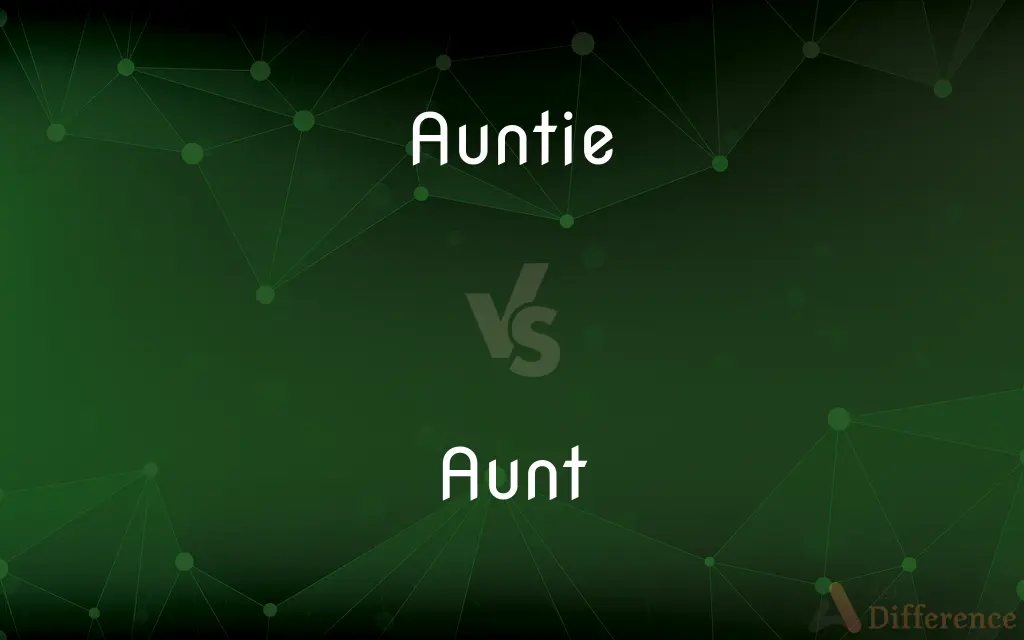Auntie vs. Aunt — What's the Difference?
By Urooj Arif & Fiza Rafique — Updated on March 12, 2024
"Auntie" is a more informal and affectionate term for "aunt," which denotes a female relative or close friend of the family.

Difference Between Auntie and Aunt
Table of Contents
ADVERTISEMENT
Key Differences
"Aunt" is the standard term used to refer to a sister of one's parent or a female relative by marriage. It's a formal designation that identifies the familial relationship in a clear and straightforward manner. On the other hand, "auntie" is a more informal and endearing term that not only refers to a biological aunt but can also extend to close family friends or elder women to whom one feels a strong familial bond.
While "aunt" is universally recognized and used in both written and spoken English in formal contexts, such as in family trees or official documents, "auntie" is often used in casual conversation and can convey a sense of warmth and closeness. It's common for children to refer to their aunts as "auntie" in various cultures, reflecting a familial intimacy.
In some cultures, the distinction between "aunt" and "auntie" carries significant cultural nuances, with "auntie" being a respectful term for any elder woman, akin to a term of respect. Conversely, "aunt" might be reserved for more direct familial relationships and used in contexts where formality is maintained.
The choice between "aunt" and "auntie" can also reflect the personal relationship between the individual and their relative. For some, "auntie" might be reserved for aunts with whom they share a particularly close or affectionate relationship, whereas "aunt" might be used for those with whom they are less intimate.
Despite their differences, both "aunt" and "auntie" play important roles in familial and social structures, offering a way to address and acknowledge the roles of these women in one's life. The preference between the two terms can vary widely depending on personal, cultural, and contextual factors.
ADVERTISEMENT
Comparison Chart
Formality
Informal, affectionate variant of "aunt."
Formal term for a female relative.
Usage
Used casually, often to express closeness or affection.
Used in formal contexts and to specify familial relationships.
Scope
Can extend to close family friends or respected elder women.
Generally refers to a parent's sister or sister-in-law.
Cultural Nuances
May carry cultural nuances, being a term of respect in some communities.
Used universally without significant cultural variations.
Personal Relationship
Suggests a closer, more personal relationship or affection.
Neutral, does not imply a specific level of intimacy.
Compare with Definitions
Auntie
An affectionate term for one's aunt.
Auntie Maria is the best cook in our family.
Aunt
A sister of one's father or mother.
I'm visiting my aunt this weekend.
Auntie
An endearing term for a woman of the older generation within a social circle.
Auntie Pat has always been there for me, like a second mother.
Aunt
A term reflecting a familial role in genealogy.
On my family tree, I listed all my aunts and uncles.
Auntie
Can imply a special bond or closeness, not necessarily related by blood.
Even though she's not my biological aunt, I always call her Auntie.
Aunt
The wife of one's uncle.
My uncle and aunt are coming over for dinner.
Auntie
Used among children to address a friend's parent informally.
Can I stay over at Auntie Emma's house tonight?
Aunt
Used to address a female adult who is a friend or respected within the family.
Aunt Susan always knows how to make me laugh.
Auntie
A respectful term for an elder woman in the community.
Everyone in the neighborhood respects Auntie June.
Aunt
Sometimes used to denote a female mentor or guide.
She's been like an aunt to me, offering advice and support.
Auntie
Another term for aunt
Aunt
Used as a form of address for an older woman, especially by children.
Auntie
Aunt.
Aunt
An aunt is a woman who is a sibling of a parent or married to a sibling of a parent. Aunts who are related by birth are second-degree relatives.
Auntie
Diminutive of aunt
Aunt
The sister of one's father or mother.
Auntie
Term of familiarity or respect for a middle-aged or elderly woman.
Aunt
The wife of a sibling of one's mother or father.
Auntie
An elderly gay man.
Aunt
The sister or sister-in-law of one’s parent.
Auntie
To be or behave like the aunt of.
Aunt
The female cousin or cousin-in-law of one’s parent.
Auntie
A familiar name for an aunt. In the southern United States a familiar term applied to aged negro women.
Aunt
(affectionate) A woman of an older generation than oneself, especially a friend of one's parents, by means of fictive kin.
Auntie
The sister of your father or mother; the wife of your uncle
Aunt
(obsolete) Any elderly woman.
Aunt
(obsolete) A procuress or bawd.
Aunt
The sister of one's father or mother; - correlative to nephew or niece. Also applied to an uncle's wife.
Aunt
An old woman; and old gossip.
Aunt
A bawd, or a prostitute.
Aunt
The sister of your father or mother; the wife of your uncle
Common Curiosities
Can "auntie" be used for someone who is not a blood relative?
Yes, "auntie" can be used affectionately for non-relatives, including close family friends or elder women respected within a community.
Does using "aunt" imply a distant relationship?
Not necessarily. "Aunt" is a neutral term that doesn't inherently imply the closeness or distance of the relationship.
Can "auntie" be considered disrespectful?
In most contexts, "auntie" is seen as affectionate and respectful, but cultural nuances should be considered, as perceptions can vary.
How do I know whether to use "aunt" or "auntie"?
The choice often depends on personal preference, the nature of the relationship, and cultural or familial customs. When in doubt, observing how others in the family or community address the person or asking directly can provide guidance.
Can men use the term "auntie" to refer to their aunts?
Yes, men can use "auntie" to refer to their aunts, especially if it reflects a close and affectionate relationship.
Does the term "auntie" have different implications in different cultures?
Yes, in some cultures, "auntie" is a respectful term used for any elder woman, akin to "ma'am" or "madam," while in others, it's specifically reserved for a close familial or friend relationship.
Is "auntie" appropriate to use in all contexts?
"Auntie" is best used in informal contexts or when a close relationship is implied. It may not be suitable for formal documents or situations.
Is "auntie" used in formal writing?
Typically, "auntie" is not used in formal writing. "Aunt" is the preferred term for formal contexts, such as legal documents or formal invitations.
Is it common for people to have multiple "aunties" who aren't actually related to them?
Yes, especially in cultures and communities where close family friends are often considered part of the extended family and addressed as "auntie" as a sign of respect and affection.
How do children typically learn to differentiate between "aunt" and "auntie"?
Children often follow the linguistic and cultural cues from their family members and the community around them, learning to use "auntie" in more familiar and affectionate contexts.
Can "auntie" be used for someone of the same age as the speaker?
It's less common but possible, especially in cultures where "auntie" is used as a term of respect or endearment for women who are older or in a mentoring role, regardless of the precise age difference.
Can "aunt" and "auntie" be used interchangeably in greetings?
In casual, personal greetings, they can be interchangeable depending on personal preference and the closeness of the relationship. In more formal settings, "aunt" is usually more appropriate.
Is it appropriate to introduce someone as "Auntie [Name]" in a social setting?
In informal social settings, especially within cultures or groups where this is common practice, it can be appropriate. It's less suitable in formal or professional contexts.
Can the use of "aunt" vs. "auntie" change as a child grows older?
Yes, it's possible that as children grow and their relationships evolve, they might shift from using "auntie" to "aunt" for a more mature form of address, or vice versa, depending on the nature of their relationship.
How do language and dialect influence the use of "aunt" vs. "auntie"?
Usage can vary significantly with language and dialect. For example, in some English dialects, "auntie" is much more commonly used than in others, reflecting regional linguistic preferences.
Share Your Discovery

Previous Comparison
Funnelled vs. Funneled
Next Comparison
Innovation vs. NovationAuthor Spotlight
Written by
Urooj ArifUrooj is a skilled content writer at Ask Difference, known for her exceptional ability to simplify complex topics into engaging and informative content. With a passion for research and a flair for clear, concise writing, she consistently delivers articles that resonate with our diverse audience.
Co-written by
Fiza RafiqueFiza Rafique is a skilled content writer at AskDifference.com, where she meticulously refines and enhances written pieces. Drawing from her vast editorial expertise, Fiza ensures clarity, accuracy, and precision in every article. Passionate about language, she continually seeks to elevate the quality of content for readers worldwide.
















































